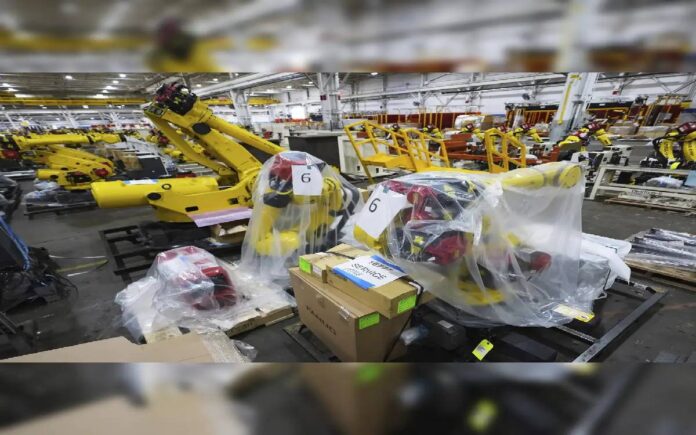Washington, D.C. — In a strategic shift aimed at tempering economic fallout, President Donald Trump’s administration is moving to ease the impact of controversial automotive tariffs, particularly on U.S.-based manufacturing operations. The announcement comes just ahead of Trump’s visit to Michigan on Tuesday, marking his first 100 days back in office.
Commerce Secretary Howard Lutnick confirmed the decision, stating that the administration will exempt some foreign auto parts used in domestic production from tariffs and prevent cumulative levies on imported vehicles. The initiative is part of what Lutnick described as a “major victory” for Trump’s trade strategy, which seeks to support domestic automakers while incentivizing foreign firms to invest in U.S. manufacturing.
“President Trump is building an important partnership with both the domestic automakers and our great American workers” ,Lutnick said in a statement issued by the White House.
“This deal is a major victory for the President’s trade policy by rewarding companies who manufacture domestically, while providing runway to manufacturers who have expressed their commitment to invest in America and expand their domestic manufacturing”.
Tariff Relief for U.S. Carmakers
According to a report first published by The Wall Street Journal and later confirmed by a White House official, the policy adjustment will prevent automakers from being double-taxed, such as being hit by both auto part tariffs and separate levies on steel and aluminum. Companies that have already paid overlapping duties are expected to receive partial reimbursements, the report said.
The move is seen as a pragmatic concession from an administration that has aggressively pursued tariff-heavy trade policies, which many economists and industry leaders warn could destabilize key sectors of the economy.
Automakers Applaud Tariff Adjustment
The response from automakers was swift and supportive. Industry giants General Motors and Ford praised the planned changes, citing their potential to alleviate pressure on manufacturing, supply chains, and ultimately, consumers.
“We believe the president’s leadership is helping level the playing field for companies like GM and allowing us to invest even more in the U.S. economy” ,said GM CEO Mary Barra.
Ford CEO Jim Farley added: “The changes will help mitigate the impact of tariffs on automakers, suppliers and consumers”.
Michigan, home to the Detroit Three automakers and over 1,000 major auto suppliers, stands to benefit directly from this tariff recalibration — a strategic political move for Trump ahead of his address in the state.
Industry Warnings Prompt Action
The administration’s move comes in response to growing pressure from auto industry coalitions, which last week warned the White House that 25% tariffs on imported parts could devastate the industry. In a joint letter, groups representing manufacturers like Toyota, Volkswagen, Hyundai, and GM urged restraint, emphasizing that the added costs would disrupt the global supply chain, raise car prices, and put jobs at risk.
“Tariffs on auto parts will scramble the global automotive supply chain and set off a domino effect that will lead to higher auto prices for consumers, lower sales at dealerships and will make servicing and repairing vehicles both more expensive and less predictable,” the coalition wrote.
The letter, addressed to U.S. Trade Representative Jamieson Greer, Treasury Secretary Scott Bessent, and Commerce Secretary Lutnick, warned that many suppliers are already financially strained and cannot absorb abrupt disruptions caused by new trade barriers.
“Most auto suppliers are not capitalized for an abrupt tariff-induced disruption. Many are already in distress and will face production stoppages, layoffs and bankruptcy,” it continued. “It only takes the failure of one supplier to lead to a shutdown of an automaker’s production line”.
A Balancing Act for Trump’s Trade Agenda
While President Trump has repeatedly emphasized a tough stance on foreign trade, Tuesday’s policy adjustment suggests his administration is open to targeted relief measures to balance domestic economic stability with nationalist trade goals.
As Trump commemorates his 100-day milestone in Michigan — a symbolic state for American manufacturing — the softened tariff stance may serve as a gesture to both working-class voters and corporate stakeholders alike.



